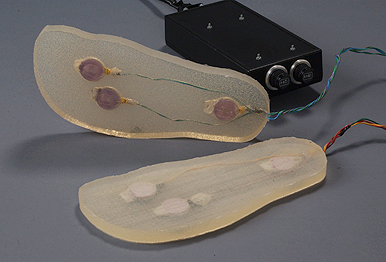Vibrating insoles improve balance in stroke and diabetic patients

Sending imperceptible vibrations through the feet of diabetics and stroke patients significantly improves their balance, according to a study coauthored by James Collins, a College of Engineering professor of biomedical engineering. The study will be published in the January 2006 issue of the American Neurological Association’s Annals of Neurology. Its results have implications for reducing the risk of falls in such patients.
Collins, also a UNI professor and winner of the University’s 2000 Metcalf Cup and Prize for Excellence in Teaching, says the results are similar to those obtained during a prior study of healthy elderly people, but this study is the first to observe balance improvement in diabetics and stroke patients using this method.
Half of the study subjects were stroke patients and the other half people with diabetic neuropathy. In the case of stroke, patients’ ability to process information transmitted by foot neurons was impaired, while the diabetics had an abnormally high threshold for neuron stimulation. Regardless of the cause, Collins’ team found that introducing the vibrations’ “white noise” increased the subjects’ use of sensory information transmitted through their feet and improved their balance.
The researchers used viscoelastic silicone gel insoles fitted with three quarter-sized vibration pads located under the heel and forefoot. They conducted 10 tests on each subject; half using a low-frequency vibration that could not be felt by the subject, and half no vibration. Subjects were not told when the vibrations were applied. Visual markers were placed on the subjects and video cameras recorded the markers’ movement, or sway.
When the vibrating insoles were activated, the subjects’ sway was, in general, reduced. The study found that the larger the patient’s baseline sway, the greater the reduction achieved by the vibrations.
“These findings have implications for people with impaired balance control, who are at increased risk for falls that can result in debilitating injuries,” says Collins. “We have designed and constructed insoles for in-shoe use and are planning to use them in the next round of studies investigating locomotion and other activities.”
The paper, “Noise-Enhanced Balance Control in Patients with Diabetes and Patients with Stroke,” was coauthored with researchers from Harvard Medical School, Spaulding Rehabilitation Hospital, Joslin Diabetes Center, Beth Israel Deaconess Medical Center, and other health-care and research organizations. The complete article is available online at www.interscience.wiley.com through the Annals of Neurology “Early View” link.
Collins recently was named to Scientific American magazine’s list of the top 50 leaders in science and technology for 2005. In 2003, he received a MacArthur Fellowship in recognition of his groundbreaking research into biodynamics.